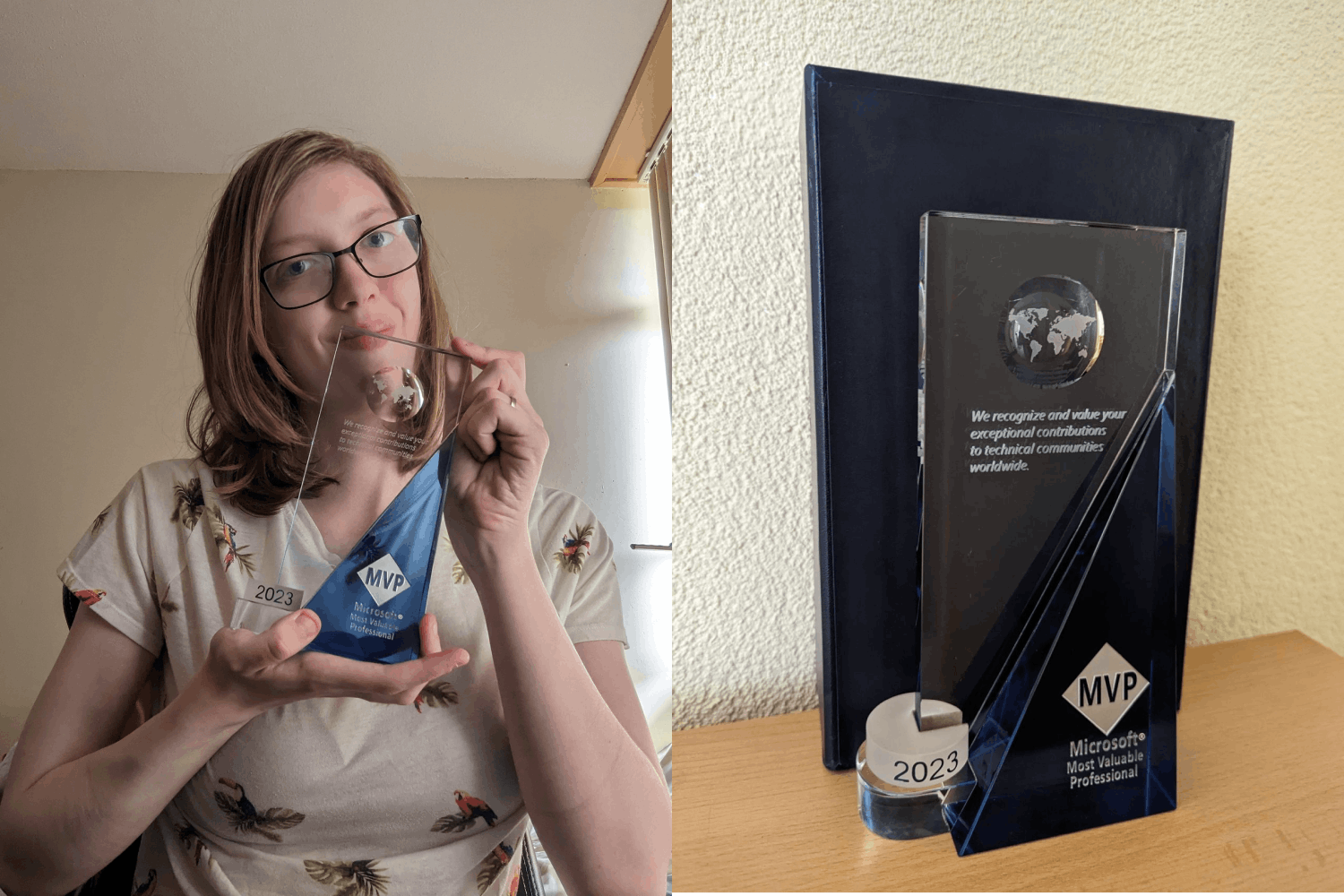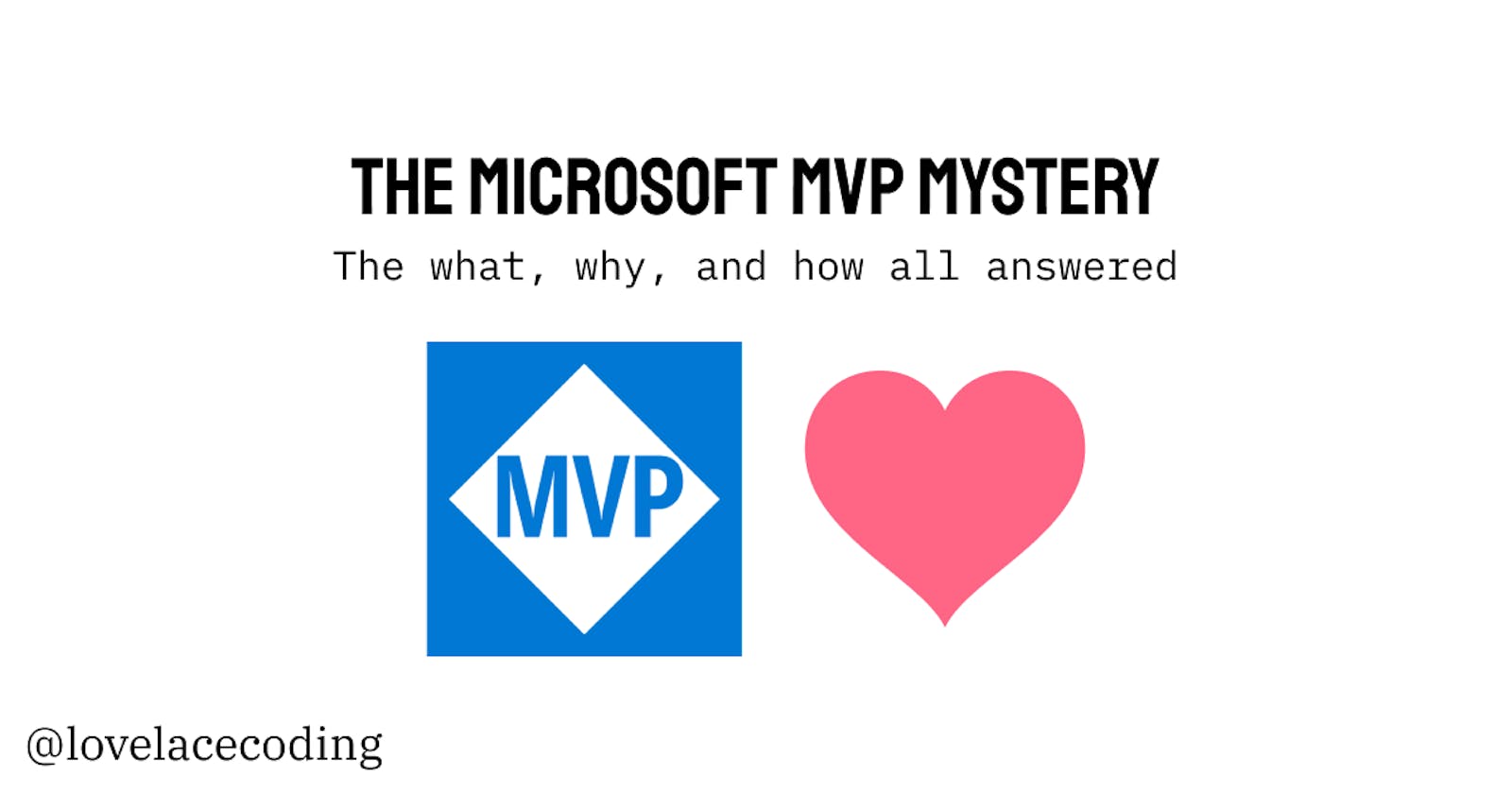Hi lovely readers,
Many of you might know this already, but I've been allowed to call myself Microsoft MVP since the 1st of April. Yay! It's been a whirlwind of a couple of months with lots of opportunities that I get (partly) because I have this title/award now, all thanks to the tech community online.

Now if you're not in the Microsoft Community, you might have no idea what a Microsoft MVP is or what people with this title actually do. This is why I wanted to write this blog post. This blog post also goes over people's wrong perceptions about MVPs and how you can become one in the future. So if you already know what a Microsoft MVP is/does, stick around as well.
Let's get started!
What is a Microsoft MVP
A Microsoft MVP is somebody who has received the Microsoft Most Valuable Professional award by Microsoft. You get this award by interacting with the tech community and inspiring others by (for example) writing blog posts, public speaking, or by making videos about Microsoft tech.
There are 3000 MVPs worldwide, as it is a very exclusive award that you don't get easily or quickly. There are also different categories you can become MVP in. I'm an MVP in the Developer Technologies category, meaning my contributions mostly focus on C#, .NET, VS Code, GitHub etc. However, there are also MVPs in Azure, Microsoft 365, security, AI, and more.
You get to keep the title and award for one year. After that year, your content gets reviewed again, and you will either be renewed for another year or join the alumni.
The benefits of being a Microsoft MVP
Apart from being 1 out of 3000 people worldwide that can call themselves a Microsoft MVP, I experienced many pros over the last few months.
Let us start with validation. After a while of making content around the Microsoft Stack, it's nice that you get a thumbs up from Microsoft. It's a sign that you did a good job and even more awesome that it gets rewarded with an actual award.
You get invited to meetings with product groups, and believe me when I tell you, there are many meetings you can join. I get a couple of emails daily with new meetings from a product group trying to get feedback on something in development or a product that's getting an update.
You know about new tech or upcoming changes in Microsoft tech before the rest of the world does. Every year just before Microsoft Build, there is an MVP Summit at the Redmond office, which can also be joined online. I joined remotely and learned a lot about the upcoming Microsoft Build announcements. Other big announcements through the year get to the MVPs by email before it goes public, which is really cool.
Finally, free stuff. Because I'm a Microsoft MVP, I get 150 dollars in Azure credits monthly. I also get free Linkedin Premium, GitHub Pro, and Github Copilot. Apart from what Microsoft gives you, there are also a lot of third-party benefits you will get as a thank-you for helping out the community. My favourites right now are a free JetBrains license and free use of Pluralsight.
The challenges of being a Microsoft MVP
There are also less fun parts to being a Microsoft MVP.
Because this is an annual award, you have to keep creating content. What you once did for fun or because you were passionate about because you liked to help now has become something you HAVE to do to keep your award.
If you want to help out the community, but your job doesn't allow it, it might be hard to mix, and you'll find yourself working on blog posts or videos after work hours which can be heavy on your mental state if you feel like you have to keep producing content.
You will also have to get used to feeling like a dumbass regularly. There are a lot of awesome MVPs out there with a lot of credentials and knowledge, and sometimes that can make you feel really dumb (or at least it has for me). As far as I've noticed from the MVP community, there is a lot of imposter syndrome going on. You will have to learn how to deal with that.
and finally, you have to watch what you say and write. There is an NDA involved because you are not allowed to share information about tech or announcements that isn't out yet. You can't tell your partner, your friends, nobody.
The Microsoft MVP Myths
You are an expert in everything Microsoft / Developer tech-related:
The Microsoft MVP award is given to people that help out the community. It's not a 'tech expert’ award, even though most people that start writing or making videos about tech often are considered experts or have quite a lot of job experience.
I consider myself a junior developer, I never lied about that, also not while writing my application. There are MVPs in Developer Technologies that have years of experience. It doesn't really matter for the Microsoft MVP award.
It's not about how much knowledge you have but what you do with the knowledge you do have.
You work for Microsoft:
Nope. I only got an award from them. They do not pay me a single cent for creating content. They do not sponsor me either. If I think a Microsoft product sucks, I can say that. I also don't speak for Microsoft and am not a Microsoft representative. In fact, if I ever start working for Microsoft or a sister company (GitHub or Linkedin), I will no longer be a Microsoft MVP.
You get paid by Microsoft to create content:
Also, no. Once again, Microsoft doesn't pay me for anything. If you see me blogging about .NET, it's for free. If you see me sharing links to Microsoft challenges or certificates, it's free. If you see me help out some people with questions about C#, it's for free.
How to become a Microsoft MVP
Let me start with the most important comment in this blog post; your goal should never be to become a Microsoft MVP.
Being a Microsoft MVP is great and awesome, but it should be an action-reaction situation. If you enjoy creating Microsoft tech content for the community already, you feel passionate about it, and people enjoy it, then you are likely cut out to be a Microsoft MVP. If you don't enjoy it and create content for the award, you won't enjoy it if you ever get in. You'll get burned out in no time.
If you enjoy making content about the Microsoft stack, I advise you to interact with Microsoft MVPs. Make friends and connections. Learn from them and ask them for feedback. Eventually, somebody will hopefully bring up if you ever thought of becoming a Microsoft MVP too. That's what happened to me.
Another MVP or Microsoft employee can nominate you, and then it's on you to fill in some questions about your motivation and list all your community activities. Once submitted, you must play the waiting game. Hopefully, you'll a reply in a couple of months. There is not a certain amount of activities you need to have on your list, hours you need to spend, or followers you need to have. How Microsoft determines who's MVP-worthy is a mystery.
That's a wrap!
Becoming a Microsoft MVP is not just about a fancy title or an exclusive award; it's about being an active tech community member, sharing your knowledge, and inspiring others. In this blog post, we've explored what a Microsoft MVP is, the pros and cons of being one, and how to start on the journey to becoming an MVP yourself.
Thank you for reading. If you have any questions, suggestions or feedback, please get in touch with me at @lovelacecoding on most social media platforms or leave a reply.
